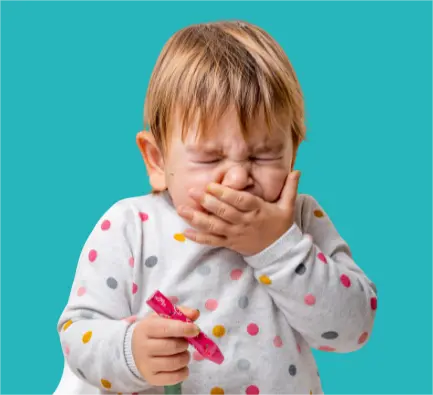Bronchitis is one of the most common respiratory diseases among children, especially in winter. It occurs when the bronchial tubes, the passages that carry air to and from the lungs, become inflamed, causing coughing and shortness of breath.
Although the condition is often mild, it can become more serious in some cases if not treated properly. Therefore, it is important for parents to learn about its causes, symptoms, prevention, and treatment methods.
What is bronchitis in children?
It is a medical condition in which the lining of the bronchial tubes that carry air to and from the lungs becomes inflamed. When these bronchial tubes become inflamed, they swell and produce excess mucus, causing a persistent cough and difficulty breathing.
Acute bronchitis usually appears after a child has a cold or the flu, and begins with a dry cough that develops into a cough with phlegm.
Causes of bronchitis in children

There are several factors that cause bronchitis in children, including:
- Viral infections such as the influenza virus.
- Bacterial infections are rare but possible.
- Exposure to smoke, such as secondhand smoke.
- Environmental pollution or chemicals.
- Weakened immune system.
- Allergies or chronic asthma may be contributing factors.
Symptoms in Children
There are several symptoms that indicate that children have bronchitis, including:
- A persistent cough, which may be accompanied by phlegm.
- A wheezing sound during breathing.
- A high fever in some cases.
- A blocked or runny nose.
- General fatigue and poor appetite.
- Difficulty breathing or rapid breathing.
Methods for Diagnosing Bronchitis in Children
A child with bronchitis is diagnosed using several methods, including:
- A clinical examination using a stethoscope to listen to the chest.
- A medical history.
- A chest x-ray if pneumonia is suspected.
- Blood tests or a nasal swab.
- A blood oxygen measurement.
Complications of Bronchitis
Bronchitis in children can cause complications, including:
- Development of the condition into pneumonia.
- Increased difficulty breathing, which may require hospitalization.
- Worsening of asthma or allergies.
- Dehydration due to lack of drinking.
- Coughing spells that affect the child's sleep.
Medications used to treat children after infection
Several medications are available to treat bronchitis, including:
- Fever reducers such as paracetamol.
- Bronchodilators such as salbutamol inhaler.
- Antibiotics only if the infection is bacterial.
- Cough medicines are sometimes used, depending on the child's age.
Other treatment methods used in addition to medications
There are several methods used in conjunction with medications to speed up recovery, including:
- Giving the child complete rest.
- Giving the child warm fluids to facilitate the expulsion of phlegm.
- Turning on a humidifier.
- Mild steam sessions.
- Elevating the child's head while sleeping.
- Cleansing the nose with saline.
How can bronchitis be prevented in children?
There are several ways to help prevent it, including:
- Prevent exposure to secondhand smoke.
- Wash your hands regularly.
- Avoid direct contact with infected people.
- Ventilate the room and home constantly.
- Get a flu shot every year.
- Strengthen your child's immunity with healthy eating and good sleep.
Foods that help strengthen your child's immunity
Following a healthy diet helps with treatment, especially foods containing:
- Honey for children over one year old helps soothe a cough.
- Ginger reduces inflammation.
- Garlic helps fight infection.
- Warm soup opens the airways and reduces congestion.
- Warm fluids and natural juices.
- Avoid fried foods and cold drinks.
The difference between bronchitis and a cold
Bronchitis is an inflammation of the airways in the chest that begins with a dry cough that develops into a cough with phlegm. There is wheezing or difficulty breathing. The child may feel generally tired or have a high fever, and it may last for one to three weeks.
While the common cold is a simple viral infection of the nose and throat, it often begins with a runny or stuffy nose, sneezing, and a mild sore throat. The cough is mild, fever is rare, and the cold typically lasts from three days to a week.
Article Summary
Bronchitis is a common illness in children that causes coughing and difficulty breathing due to inflammation of the airways. Most cases are caused by a virus and do not require antibiotics. Treatment involves rest and simple medications. It can be prevented by maintaining good hygiene, avoiding exposure to secondhand smoke, providing a healthy environment, and maintaining a good diet, which plays an important role in strengthening immunity and accelerating recovery.